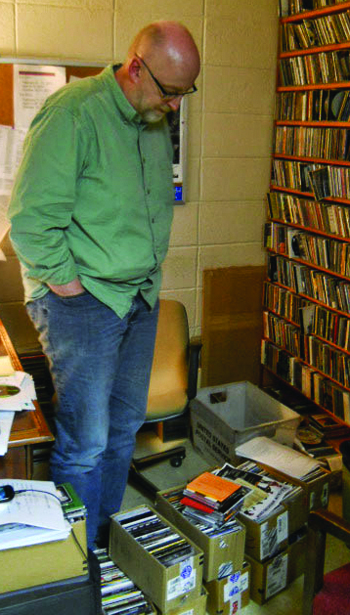Story by KEVIN LYON (for The Muleskinner)

Jon Hart stands over boxes of submitted music in his office. The Bridge gets hundreds of demo CD per week. (Photo by KEVIN LYON, for The Muleskinner)
Unlike some stations, 90.9 The Bridge, UCM’s alternative radio station, focuses on providing new types of music for its listeners instead of simply rotating Top 40 songs.
Started in 1963, 90.9 The Bridge became a Triple A station (Adult Album Alternative) on Aug. 19, 2001.
Jon Hart is the program coordinator. “We aim to musical first adopters,” he said. “Just like the people who buy iPads on their first day out, we want to break new music.”
Thank you messages and records line the walls of the broadcast studio, from musicians like Norah Jones, Jack Johnson and Ingrid Michaelson, all of whom were first played on stations just like The Bridge.
The station’s radio tower signal reaches anywhere from 300 to 800 thousand people, including Lee’s Summit and Kansas City.
“We don’t really have a demographic,” Har t said. “When I go out and meet our listeners, it’s kids from 16 up to people in their seventies. There isn’t any age or race or gender to what we do.”
The Bridge is a noncommercial station that has a small but committed following, and has to raise enough funds through pledge drives to keep the signal going.
Hart emphasized that he doesn’t talk about artists he has met just to name drop, but to emphasize that what early musical adopters like The Bridge do is open people’s minds to music that could one day be played on a Top 40 station.
“We aren’t doing this to build ourselves up as tastemakers,” Hart said. “But if you’re interested in a living and breathing culture, stations like us are really important.”
The assortment of music played on 90.9 is wide, and Hart, Byron Johnson, operator and producer, and other workers contribute to the programming, the training and the technical support. “We do everything here,” Johnson said.
Byron began working at The Bridge in 1967 before going off to work in other places, and Hart started on air in 1972, when he was still attending Warrensburg High School.
Both men said they subscribe to the saying that when you do something you love, you never work a day in your life.
“This station has, by far, the most dedicated listeners I’ve ever encountered,” Hart said.
“We encourage people to speak up, call in, and they do,” Johnson said. “Sometimes they say the music sucks; sometimes they say they really love one song. But the listeners are engaged, even if there aren’t thousands of them out there.”
Hart said they depend on their listeners, both to stay alive and to stay connected, as listener feedback and support is what motivates them both to work hard to bring new music forward.
“The new census just drove up our population,” Johnson said. “We’ve got more listeners and the requirements are higher than they’ve ever been.”
Johnson, who has worked in commercial radio for 40 years, said that 90.9 is different because “commercial supports advertisers and the bottom line. You have to make money to keep your job; that comes first. But here, we support the listeners. That’s the biggest difference.”
The listeners are needed, because state and federal support for public broadcasting has significantly declined over the last five years.
“How do I say this, we get no direct assistance from the state or federal government,” Hart said.
The funding for much of the station comes from the UCM budget, which has been blindsided by the recession even as enrollment has increased. “We have taken our share of cuts,” Hart said, “that’s for sure.”
Hart said The Bridge works to bring new music from new artists to the fore, where it might be heard by someone for the first time.
“If I introduce someone to something that they’ve never heard of and give someone a new favorite artist, that’s the best I can hope for,” he said.
The station aims to focus on the listener. It provides the ser vices of NPR radio, like news broadcasts and programming that people outside the range of 89.3, the Kansas City NPR station, can’t get on their car radios.
The Bridge gets hundreds of demo CDs a week. “We have stacks of boxes of new music,” Hart said. “We put new music into rotation from all over the place. Music always starts somewhere.”
The new superstar of the music industry, Adele, who has sold millions of copies of her albums in the last two years, was played on The Bridge four years ago.
“Even if you don’t listen to us, what we do is important, because early adopting stations push new artists and make it so that you can actually hear new good music,” Hart added. “You don’t want it to just stay in the garage.”
For more information on The Bridge, visit www.ktbg.fm.


Leave a Reply